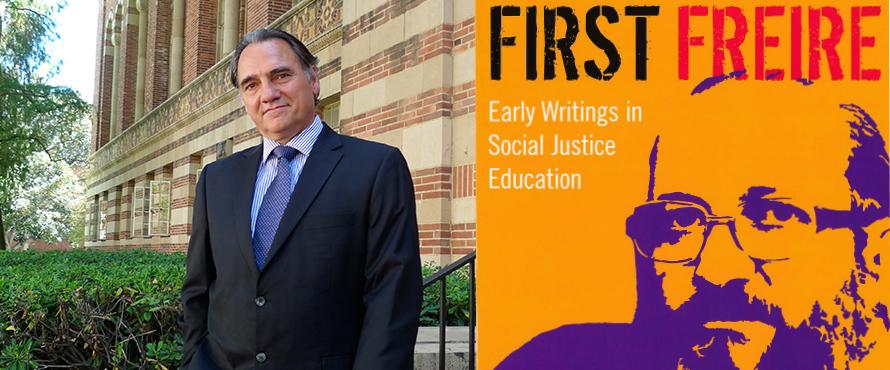The Presidential Lecture Series presents:
Carlos Alberto Torres
The Struggle for Social Justice Education:
Contributions from Paulo Freire and the Pedagogues of Liberation
Tuesday, October 14th at 7:00 p.m.
Fine Arts Center Recital Hall
No tickets or reservations required
A book signing will follow the lecture.
This event is sponsored in part by the Latino/a Resource Center, the Division of Student Affairs, the Office of Cultural Events, ENLACE Leadership Institute, the College of Arts and Sciences and the College of Education.
Carlos Alberto Torres, Associate Dean for Global Programs and Distinguished Professor of Social Sciences and Comparative Education, and former Director of the UCLA-Latin American Center, is a political sociologist of education who completed his undergraduate work in sociology in Argentina (B.A. honors and teaching credential in Sociology, Universidad del Salvador), his graduate work in Mexico (M.A. in Political Science, FLACSO) and the United States (M.A. and Ph.D. in International Development Education, Stanford University), and post-doctoral studies in educational foundations in Canada (University of Alberta). He is also the Founding Director of the Paulo Freire Institute in São Paulo, Brazil; Buenos Aires, Argentina; and UCLA. Dr. Torres has also been a Visiting Professor in universities in North America, Latin America, Europe, Asia and Africa. Currently, Dr. Torres in the President of the World Council of Comparative Education Societies (WCCES).
Over the last thirty years, Dr. Torres has contributed to three fields: Latin American Studies, Sociology of Education and Comparative and International Education. Dr. Torres' areas of theoretical research focus on the relationship between culture and power, the interrelationships of economic, political, and cultural spheres, and the multiple and contradictory dynamics of power among and within social movements that make education a site of permanent conflict and struggle. His empirical research focuses on the impact of globalization in Latin America, especially on higher education in Argentina, Brazil and Mexico. He is also considered one of the world's leading authorities on Latin American Studies, and the principal biographer of Brazilian philosopher and critical social theorist, Paulo Freire.
Dr. Torres has authored or edited more than 60 books, and more than 200 research articles, chapters in books and entries in encyclopedias in several languages--he speaks fluently in Spanish and Portuguese. Most notably, Dr. Torres' theoretical and empirical research has resulted in the development of a critical political sociology of education, highlighted in his much-heralded book with Raymond Morrow, Social Theory and Education.A book he edited with Robert Arnove, Comparative Education: The Dialectics of the Global and the Local, now in its fourth edition, is the textbook of choice for more than fifty Comparative Education programs in the English-speaking world. Another of his books, Education, Democracy and Multiculturalism: Dilemmas of Citizenship in a Global World, translated in several languages, suggested new agendas for these fields. All three books contain critical interpretations of cultural and social reproduction theory, theories of the state, analyses of multiculturalism, feminism and other approaches to social diversity, inequality, and the struggle for social justice education.
For the last decade, Dr. Torres has been working from a global perspective that encompasses human rights, pluralism and citizenship, wresting education away from state dominance, and the globalization of economies, communications and labor forces. The question of educating the global citizen is at the top of his research agenda. Understanding the educational policies of the new social democratic governments in Brazil and Argentina, and the impact of the new social movements constitutes the next empirical phase of his research. His recent work concentrates also on global learning and global citizenship education.








